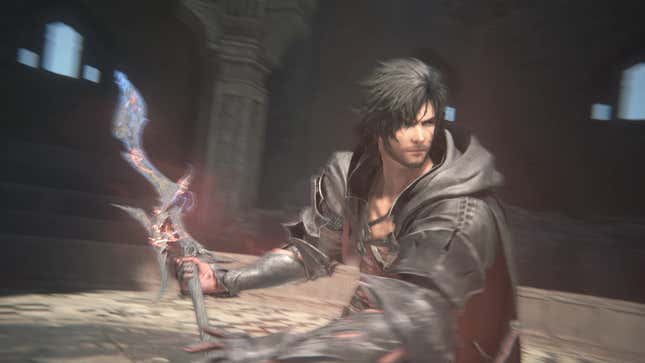
Every Friday, A.V. Club staffers kick off our weekly open thread for the discussion of gaming plans and recent gaming glories, but of course, the real action is down in the comments, where we invite you to answer our eternal question: What Are You Playing This Weekend?
Final Fantasy XVI is big. Final Fantasy XVI is violent. Final Fantasy XVI is melodramatic, and cinematic, and often very, explosively, loud.
Final Fantasy XVI is also kind of, a little bit, sort of … boring?
That’s the conclusion we’ve come to after 60 hours with Square Enix’s bombastic latest—which, as it turns out, isn’t enough time to finish it, but might, possibly, be enough time to be finished with it. And, as we’ve noted more than once in this space, that’s a hard thing to hold against a video game: After all, it’s a rare film, or even TV show or book, where “Yeah, it didn’t hold my attention into Hour 61" is a credible complaint.
Even so: While FFXVI’s story remained suitably gripping throughout our time with it—channeling at least an appearance of brutality and darkness, even if it sometimes only felt bloody-skin deep—its gameplay couldn’t do the same job. And that ultimately comes back to the game’s most distinguishing feature, when held up against the rest of the series: Its decision to jettison the franchise’s traditional role-playing combat in favor of becoming a full-fledged action game.
It’s a perfectly thrilling action game—at least, at first. Heroic protagonist Clive is fast-moving and versatile, bouncing across the battlefield with his loyal dog in tow. The game’s Stagger system, which encourages you to wear down bigger enemies’ stamina bars before unleashing maximal damage on them once they’ve been stunned, lends a natural rhythm to the fights. And the big, climactic boss fights, are suitably thrilling—especially those that involve Eikons, the game’s kaiju-esque take on Final Fantasy’s traditional summons.
The issue is that this combat never really evolves, even as Clive adds more elemental abilities to his repertoire. (And some of them, like a shockingly effective fire shield spell you pick up about 10 hours in, negate a decent chunk of the game’s loose skill curve in any case.) Enemy attack patterns get a tad more complex, but it’s a small tad, and, ultimately, fighting enemies at the end of the game doesn’t feel meaningfully different from fighting them at the beginning. That’s perfectly acceptable, in an action game that runs to maybe 10, or even 20, hours in length. But it’s damning at the durations Final Fantasy XVI is operating at.
What we have here, really, is an unfortunate embrace of moderation. Numerous elements in the game’s design—most notably, a set of rings players can equip that automate many of the more strenuous parts of combat—reveal a certain discomfort at the idea of taking a series that spent so many years asking players to skillfully navigate menus, and turning it into a Serious Action Game of this ilk. But the consequence is that Final Fantasy XVI lacks complexity as both a role-playing game and an action title, and you can’t run for this many hours without bringing some kind of complexity to the table. Beautiful cutscenes are great, well-acted story sequences are wonderful. But if the thing you’re asking players to do for 85 percent of their time is the same thing, over-and-over again—often just with ever-more-inflated health bars for foes, which certainly doesn’t help the pacing issues—then at some point it’s going to wear out its welcome.
Final Fantasy XVI is a game full of surprising moments, and great performances. (The year of Ralph Ineson Being Your Boss In Video Games has been a genuine blessing.) Its story at least feints toward interesting moments of bracing darkness, and characters with more moral edges to them than this series is used to hosting. But at some point, you find yourself looking across a wondrous landscape crafted from the depths of the imagination, or an ominous dungeon dripping with atmosphere and menace, and find yourself asking, “God, how many of the same five fights am I going to have to do in here?” And that, for any game with these kinds of ambitions, is death.